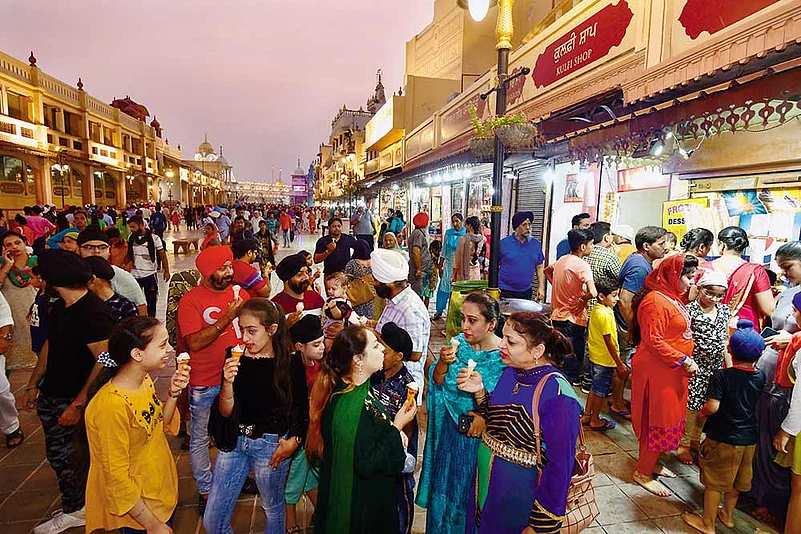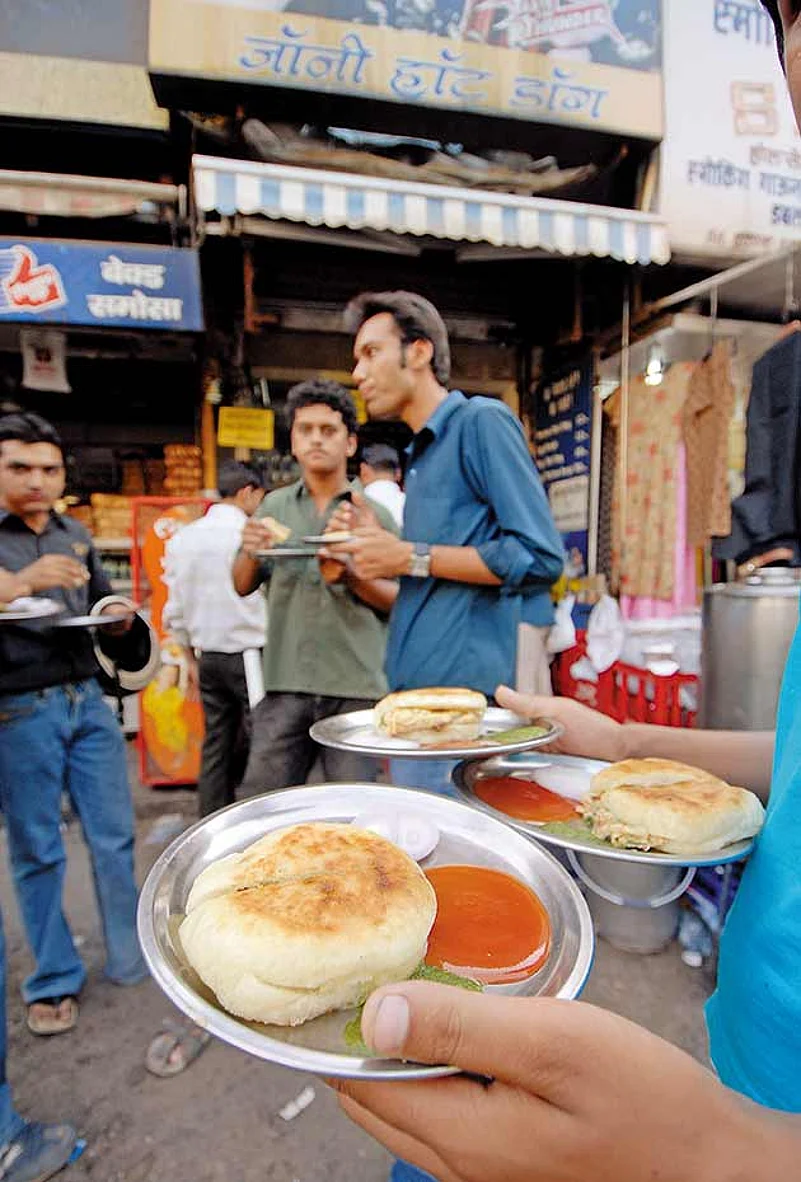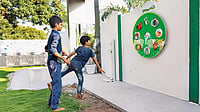The chole bhatures, stuffed paranthas, pav bhajis, golgappas, chaats are finger-lickin’ good, as are the melt-in-mouth galauti kababs, chicken rolls, biriyanis, chow-chows, and idiyappams...Well, you can have them served by liveried waiters at gourmet restaurant. But that’s not the real McCoy. For many of us, they are not as tasty until sold from sidewalk-hogging dirigible carts, or small brick-and-mortar stalls—a fixture on city streets. That’s street food, a vibrant subculture populating our cities and towns, dishing out an inexpensive delectable fare, often greasy and spicy. Be it Delhi’s Chandni Chowk, Mumbai’s Khau Galli, Calcutta’s Dalhousie or Lucknow’s Hazratganj, every state has food hubs selling local cuisine. The carts add a sense of community, and give a peek at the microcosm of the city’s millions and its storied history. They are a repository of age-old food culture; they attract local foodies as well as tourists. They make good food accessible and inexpensive.
They don’t do any serious damage to wallets, but are sometimes indulgent on sanitation—a reason why authorities see hawkers as an illegal nuisance selling inferior foods sourced and prepared unhygienically. The street food business has grown exponentially. Hardworking city slickers are its main clientele. This flourishing trade has now attracted unskilled vendors, the majority of them illiterate or semi-literate, having no knowledge whatsoever about food safety. Unhealthy cooking practices, unhygienic handling of raw and cooked food, washing dishes in dirty water, and stinking surroundings because of rotting, leftover food are major deterrents.

Still, these are hopeful times; change is stirring on the woks of roadside stalls. The Food Safety and Standards Authority of India (FSSAI) has initiated a programme to certify select roadside food hubs across the nation as clean and safe after training the hawkers on personal hygiene (like using gloves and aprons, keeping fingernails trimmed, washing hands with soap before handling food every time, wearing a headgear, covering the mouth, avoiding touching the face, head, hair or any body part). “One of the most important aspects of this initiative is to train street food handlers on good hygiene practices and ensure food safety when meals are prepared and served,” says Pawan Agarwal, CEO of the FSSAI.
The guidelines don’t stop at hygiene training for vendors. The FSSAI also audits the food safety status of a hub (clean location, sanitation facilities, availability of potable water, pest control, waste disposal et al) before giving the certificate, which is valid for a year and renewable subsequently. Besides, 80 per cent or more of the vendors must sell local and regional cuisines.
Five such roads in Gujarat, two in Maharashtra and one each in Madhya Pradesh and Punjab have been already certified by the FSSAI as Clean Street Food Hub. Besides, over 30 food streets in over ten states, including Uttar Pradesh, Odisha, Haryana, Kerala, Gujarat, Karnataka and Goa, have been identified for certification.

People enjoy a veritable fare at Darbar Sahib.
In Delhi, 14 places have been identified—including Chandni Chowk’s Paranthewali Gali, Zoological Park, Qutub Minar. But the certification process is yet to begin. “It’s a great initiative. I think this will make civic bodies responsible for keeping the area clean. I want this scheme to be started in Delhi as soon as possible,” says a food vendor in Paranthewali Gali. He admits that vendors are not aware of hygiene and food safety and often people complain about that. Another vendor, at the Sector 32 market in Gurgaon, says: “We are training and it is helpful. I never wore hand gloves and aprons before but now I do it. I tell my staff to keep themselves neat and clean, which makes a good impression on visitors.”
Under the project, state governments have to provide a list of food streets with an aggregation of at least 50 vendors that can be developed as clean hubs. In Tamil Nadu, a place selected for the certificate is Elliots Beach, Besantnagar, Chennai, where around 50 stalls sell fast food. Their numbers quadruple during annual weeklong Velankanni Church festival in September. Though the Chennai civic agency gives licences and regulates these eateries, inspection is often irregular and cursory. A crackdown happens only when there are reports of suspected food poisoning or photos of unhygienic conditions are splashed on media. With sales peaking during the fest, sanitation becomes the biggest casualty—oil on fry pans reused for the nth time, utensils washed in dirty water, leftovers discarded in the open, attracting flies and birds.
A similar scene unfurls every day in Khau Gali near Ram Mandir in Bhubaneswar. This is the go-to street for breakfast/lunch/dinner, or to simply buy a snack; popular among the hipsters but underrated by the gastronomic cognoscenti because of hygiene issues. Most eateries keep their foods, cooked and uncooked, in the open, exposing them to dust, air pollutants and parasites. Take, for instance, the top-selling panipuri or phuchka. The tangy, masala water is generally dirty. The cloths that the vendors use to wipe their hands are unfailingly shabby. Since they make the panipuris at home, the quality is suspect too. Authorities hope that the FSSAI project would help such hawkers—on Elliots Beach and in Bhubaneswar—get a shot to stay relevant in this takeaway and home delivery age.

Juhu Chowpatty has always been a popular street food destination.
The food safety regulator has requested corporate houses to support the initiative with funds. Nestle footed the bill for training and auditing at Kankaria Lake food hub in Ahmedabad, the first certified Clean Street Food Hub in the country. Similarly, Nectar Group sponsored the food hub near Darbar Sahib, Amritsar. Companies like Hindustan Unilever and Jubilant FoodWorks have come forward too. According to reports, more than 10 million people visit Kankaria Lake every year and experts believe footfalls rose significantly since it earned the safety tag.

Chappan Dukan is a certified street food hub now.
Paramvir Singh Deol, head of operations, the Food Safety Awareness and Training Organisation (FASTO), which trained vendors at Kankaria Lake and Darbar Sahib, says: “I was excited to see vendors showing interest. The training involves half-a-day of classroom activities and two days of on-the-job exercise.” The cost of the entire exercise is Rs 3 lakh for each hub—the minimum—and it can go up to Rs 10 lakh. Deol says the success of the project depends on the promptness of the state government, especially the food safety department and the municipal agency. “If I train the vendors, but garbage collection or cleaning of the area by municipal workers is not regular, the project will fail. So, it’s a collective responsibility.”


























